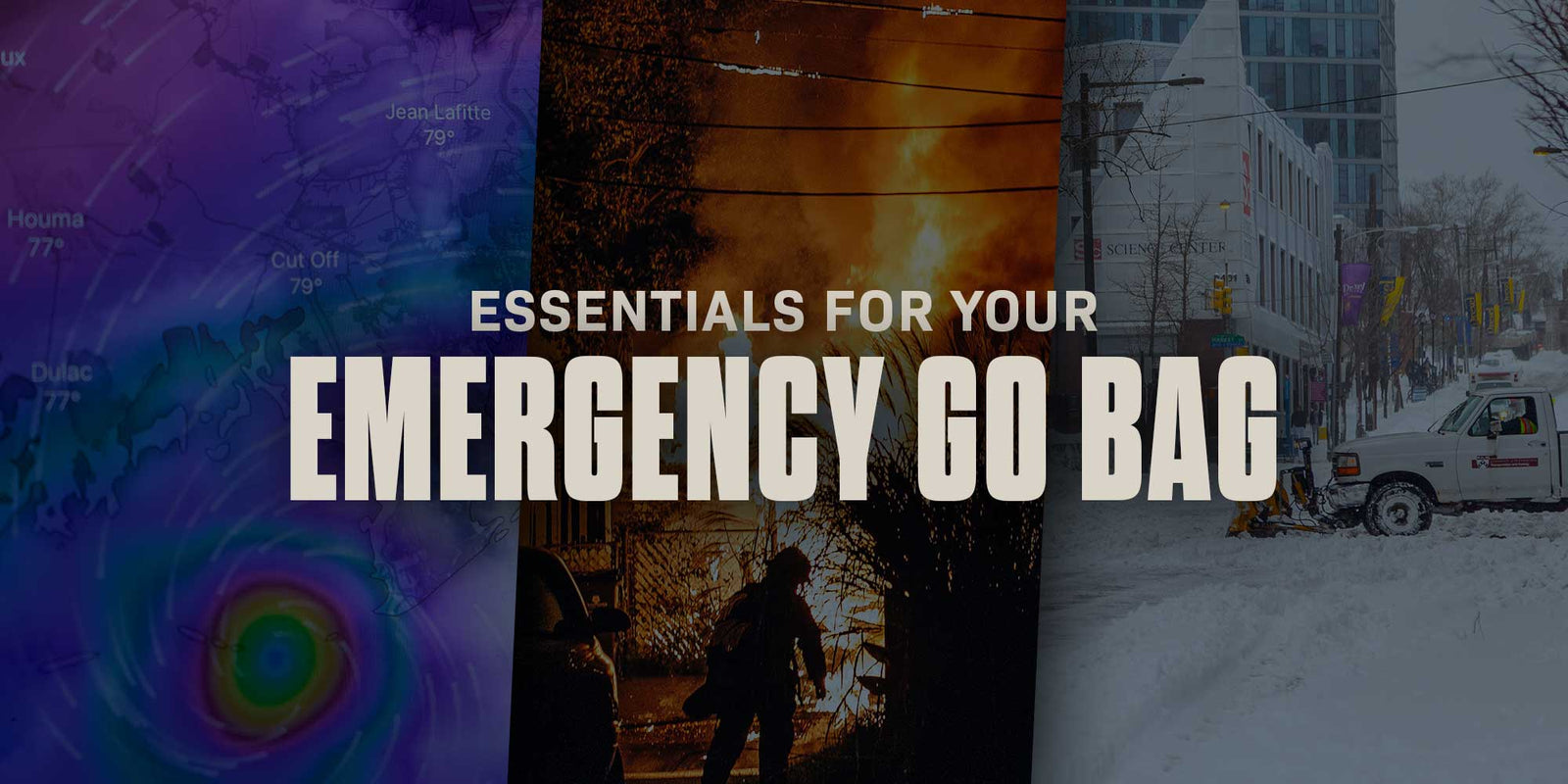In an emergency, sometimes it's best to stay put, and sometimes you have to get out of there. Here’s a streamlined go bag essentials list for when you need to escape to safety in a hurry. In this list, we focus on what’s necessary for 72-hour displacement and the goal of getting to safety (a hotel, family, or friend’s place) asap.
This list doesn't include everything you might need, just the essentials for short-term survival—with the ability to grab the bag and get out quickly. Be sure to choose a bag that leaves room for last-minute essentials (those that aren't stored in the bag long-term) such as photo albums, small keepsakes, etc.
In this document, we've linked to the essentials that we provide on HomesteadGear.com as well as a few links to items on Amazon in case you need to plug any holes in your gear. For an easy, all-in-one solution see Uncharted Supply Co. products here.
Travel Essentials
Water and Hydration:
- 1 Gallon of water per person (pack lightweight bottles or collapsible containers for refilling)
- Water filter or purifier (e.g., GravityWorks, LifeStraw or Sawyer Mini) for emergencies if you run out or if the water in your area becomes contaminated
- Food: Lightweight, non-perishable snacks (protein bars, trail mix, jerky)
- Freeze-dried meals (optional if unsure about immediate food access)
- Eating utensil (spork or similar compact tool)
First Aid:
- Basic first aid kit (bandages, antiseptic wipes, pain relievers, gloves)
- Mask/Respiratory protection for smoke/chemicals
- Any prescription medications (minimum 3-day supply)
- Emergency thermal blanket (for unexpected exposure to cold, wind and rain)
Personal Hygiene:
- Toothbrush, toothpaste, and travel-size soap. This $5 travel kit makes it too easy.
- Hand sanitizer or wet wipes (included in the kit linked above)
- Feminine hygiene kit
- Compact towel (optional, for quick clean-ups).
- Toilet supplies (gas stations may be out)
Tools and Supplies
Lighting and Power:
- Flashlight or headlamp (with spare batteries or rechargeable option).
- Phone charger (preferably a small solar charger or power bank).
- Multitool or Knife
Navigation and Communication:
- 2-way Radios (GMRS or Ham)
- Portable radio (uses less battery and receives more channels than your phone or car—and doesn't rely on your vehicle)
- Whistle (to signal for help, if necessary)
Clothing and Comfort
- Weather-appropriate change of clothes (lightweight, breathable, and moisture-wicking)
- Sturdy shoes (for walking if transportation isn’t accessible or you have to flee your car—flip flops WON'T do)
- Extra socks (we recommend wool) and underwear
- Work gloves to protect your hands from heat, cold, and injury
Key Documents and Personal Items
Critical Documents to Grab from Home:
- IDs (driver’s license, passport, etc.)
- Insurance documents (home, car, health)
- Medical records (list of allergies, prescriptions)
- Emergency contact list (phone numbers written down in case your phone dies)
- Cash (small denominations for essentials like gas or food)
Memories and Valuables:
- Photos (digital backups are ideal, but grab a few physical prints if space allows)
- Irreplaceable family keepsakes (prioritize compact and lightweight items)
- A backup hard drive with important family documents and photos
Miscellaneous Must-Haves
- Pet Supplies: If you have pets, include a small bag of food, collapsible water dish, leash, and pet medications.
- Lightweight Blanket or small pillow for kids or personal comfort
- Notebook and pen/pencil: To write down emergency information or communicate if your phone is inaccessible. We like this weatherproof notebook for all-weather conditions, but a cheap 99 cent version from the supermarket will do just fine, too!
What to Leave Behind
Almost important is what NOT to take. You'll have limited space and won't have time to be making decisions on what to bring and leave. Keep in mind that in this case, you're grabbing gear for (hopefully) temporary relocation due to displacement, not long-term survival.
- Extensive survival tools like bivvy sacks, tarps, or large fire-starting kits unless evacuation involves wilderness travel.
- Excess food beyond 3 days (the goal is to get to safety, not long-term camping).
- Heavy or bulky gear that makes the bag cumbersome and slows down your evacuation.
This go bag prioritizes essentials for rapid evacuation and short-term displacement. It includes what you need to stay safe, comfortable, and prepared for the first 72 hours while en route to shelter with friends, family, or a hotel.
If you don't have the time or skills to build your own, we love the Uncharted Seventy2 and Seventy2 Pro for a quick all-in-one go bag and featured it in the Homestead movie and series because it's comprehensive and top-quality.
